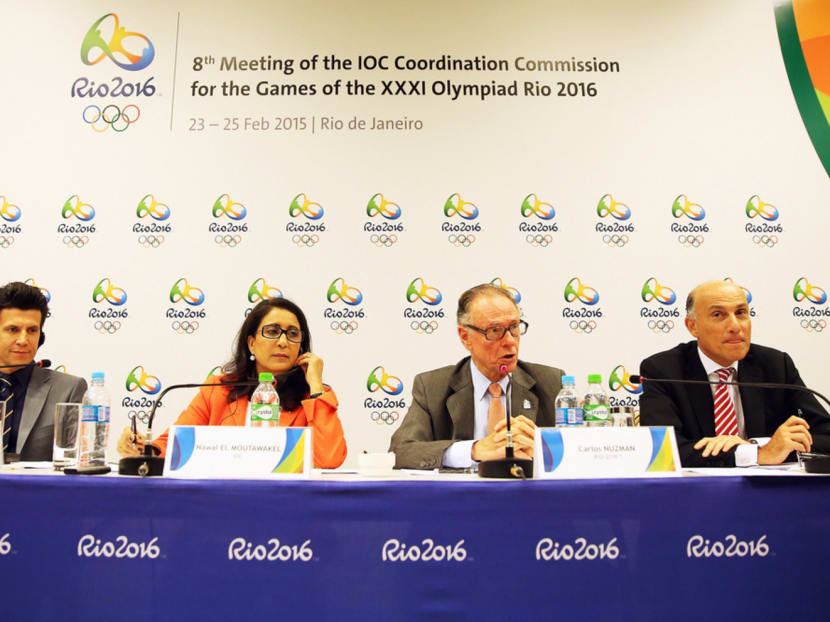Rio 2016 organisers must step up, says IOC
RIO DE JANEIRO — Nawal El Moutawakel, the head of the International Olympic Committee’s (IOC) inspection team wrapping up a three-day tour of venues for the 2016 Olympic Games in Rio de Janeiro, said on Wednesday that her team was encouraged by progress ahead of South America’s first Olympics.

(From left) Olympic Games executive director Christophe Dubi, IOC member from Morocco and chair commission Nawal El Moutawakel, Rio 2016 organising committee president Carlos Nuzman and Rio 2016 organising committee CEO Sidney Levy at a press conference in Rio de Janeiro on Wednesday. Photo: Getty Images
RIO DE JANEIRO — Nawal El Moutawakel, the head of the International Olympic Committee’s (IOC) inspection team wrapping up a three-day tour of venues for the 2016 Olympic Games in Rio de Janeiro, said on Wednesday that her team was encouraged by progress ahead of South America’s first Olympics.
Just under a year ago, a vice-president of the IOC had described Rio’s preparations as the worst in memory.
Nonetheless, El Moutawakel cautioned that the crunch is coming, with 21 test events set for this year and 44 in all before the Games open on Aug 5 next year.
“Rio is entering the most intense period of preparations, a period where Rio must reach a new level of detail in its planning,” said the Moroccan runner, who won the women’s 400m hurdles at the 1984 Los Angeles Olympics.
El Moutawakel singled out the new Olympic golf course, a velodrome and an equestrian site as venues that face tight deadlines.
Despite delays, all venues are almost certain to be ready. However, other Games-related projects may not be.
This also happened with last year’s World Cup. Stadiums were finished, but dozens of other projects were incomplete, and many still are — with funds running out.
Rio is spending about US$14 billion (S$ 18.9 billion) on the Olympics — a mixture of private and public money. Brazil spent US$12 billion on the World Cup.
Just moments before El Moutawakel spoke, Rio de Janeiro’s state environmental agency confirmed that it was investigating fish deaths that left thousands of carcasses floating in Guanabara Bay, the venue for Olympic sailing events.
State environmental officials have repeatedly said they would not be able to reach the goal of treating 80 per cent of the sewage that flows in the bay before the Olympics begin. Fifty per cent is the figure they have talked about.
In addition to raw sewage, the bay is awash with floating rubbish. Part of Rio’s commitment when winning the Games in 2009 was to clean the bay, which in many spots looks and smells like a sewer.
El Moutawakel offered no specifics, but said she had been reassured by government officials that the problem was being tackled.
She also stressed that Rio would be safe. Five police officers were killed last weekend, and last month, at least five people were killed by stray bullets, caught in crossfire between warring gangs in the Rio area.
Olympic Games executive director Christophe Dubi said a subway line extension was back on schedule after it had been delayed by tough drilling through a mountainside, but added that it could be finished a few months before the Games open.
However, the pledge of getting 68 new hotels built for Rio could be at risk. El Moutawakel said a task force was to meet later on Wednesday, “so every spectator, athlete and stakeholder can have a room in time for the Olympics”.
IOC president Thomas Bach, who met a group of 100 students separately on Wednesday, was pressed about severe water shortages during a town hall meeting and was asked repeatedly to justify building a golf course and a canoeing venue. South-eastern Brazil, which includes Rio, is experiencing the worst drought in 80 years.
Bach said he had been told by Rio Olympic officials that heavy rain this month had resolved the problem and he seemed surprised to hear otherwise.
Said the German: “My impression so far was ... that the water crisis is (not) and will not be a permanent crisis.” AP





